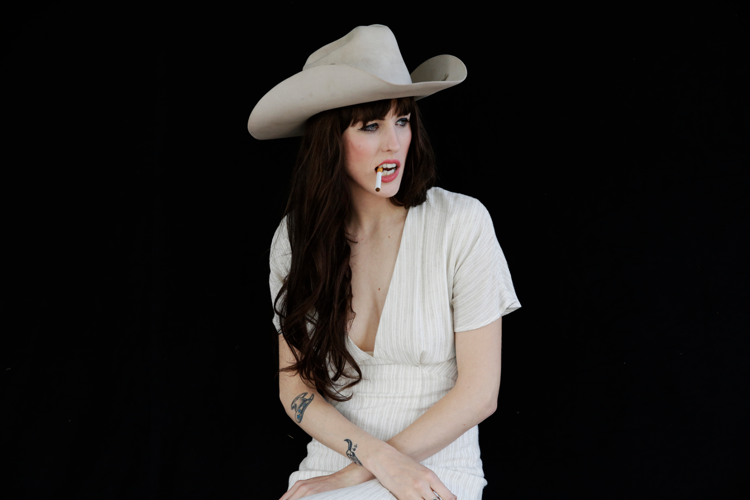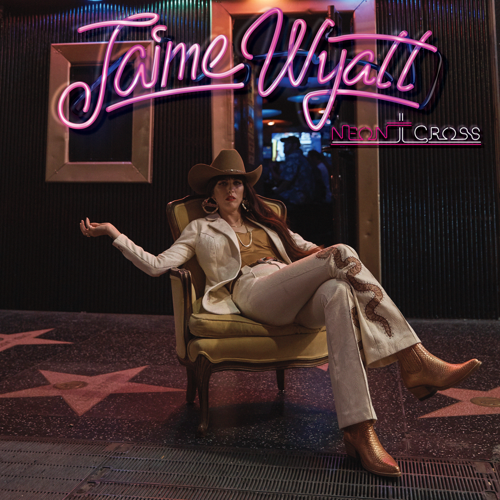
Country songsmith Jaime Wyatt has overcome a litany of obstacles during her 34 years on earth. As documented on her 2017 record Felony Blues, she struggled with addiction for most of her 20s, and spent nearly a year in the Los Angeles County Jail for robbing her heroin dealer. In just the past few years, she relapsed, lost her father to ALS and a close friend to an overdose, came out as a gay woman and divorced her then-husband.
Despite suffering enough hardship to make her life sound like the plot of a sad country song, Wyatt has emerged in a good place. With a newfound clarity, acceptance of her sexual orientation and more than two years of sobriety under her belt, she has made an album that funnels all that hurt into healing. Neon Cross, out Friday via New West Records, is Wyatt at her most unfiltered.
Wyatt, who recently moved to Nashville, came by country music naturally. She grew up on an island in Washington state, immersed in cowboy culture during the ’90s, when Garth Brooks and Hal Ketchum dominated the airwaves. She began playing music as a child, and folk and rock weaved their way into her personal sound when she made a move to California as a young adult. Lyrically, she incorporates approaches from pop music over the past three decades.
“In some ways, I feel like a lot of my songs aren’t in the traditional storytelling way of country music,” Wyatt says. “I don’t even think that’s my thing. I think emotions are my thing.”
The songs on Neon Cross hinge on raw emotion in a way that’s never so specific that someone can’t apply them to their own journey. She confronts her human need for mercy and fears of having to confront her inner demons. She also even poses a simple, universal question about heartbreak: “Why does it hurt so bad?”
This selection of vulnerable songs comes to life partially thanks to Shooter Jennings, who produced Neon Cross. While he’s known for working with classic-country-leaning artists (he and Brandi Carlile co-produced Tanya Tucker’s stunning 2019 LP While I’m Livin’), he’s also deviated to groovier sonic soundscapes, like with his disco-country crossover Countach (for Giorgio) from 2016. Jennings’ multifarious musical sensibilities made him perfect for bringing Wyatt’s vision to fruition. The two have a longtime friendship from which a creative working relationship blossomed.
“We were on the road a lot,” Wyatt says. “It was a lot of geeking out and listening to records. I could see that process go into the actual record-making process too. He has a very good ear for song selection and song sequencing. All around, he’s just a vibe curator.”

Jennings listened to Wyatt’s vision for what her album should sound like, but he also gave sophisticated direction she was willing to accept. When composing one song, Wyatt felt that its style leaned toward David Allan Coe or Shooter’s dad Waylon. Then, Jennings played a Harry Nilsson track and pointed out the pattern being played on the kick drum, which led to the song going in an entirely new direction. His ideas — sometimes unorthodox, but not just for the sake of being unusual — and their open communication led to a finished product that feels fresh and intentional.
The album also features some legendary guests. In some of his final recordings before his suicide in August, Neal Casal played guitar on many of the tracks, giving them an extra kick into the ether. Wyatt duets with Jessi Colter — Jennings’ mother — on the Dolly Parton-like feminist anthem “Just a Woman.”
“I got the recordings back and listened with my mother,” Wyatt says of the duet. “We were in Los Angeles, driving in her car, and we both cried.”
Standout track “Rattlesnake Girl” may be the most personal. It’s a song about identity, chronicling Wyatt’s struggle with coming out and how acknowledging her orientation gave her a newfound confidence. That self-assurance has, in turn, changed her creative process.
“I figured out why I felt different for my whole life,” Wyatt says. “I don’t think people looking at me would expect that I’ve lived a life that has been some rough places. That’s what it’s kind of celebrating too, that maybe I’m also a badass for being different. I felt shitty about myself for a long time. I’m not a pretty, graceful, feminine woman. I have some of those qualities, but really I grew up skateboarding. I play a lot of guitar. I tour around in a van with dirty young men. I’m a rattlesnake girl. I’m trying to celebrate my uniqueness in that song.”
Wyatt doesn’t sugarcoat the truth, and she knows that can lead to a wide range of reactions. Some people will embrace her for speaking out about being a queer artist, while others will automatically reject what she has to offer. Nevertheless, her hope is that the strong statement of Neon Cross can reach suffering people. By using songwriting as an outlet for grief, Wyatt was able to find, above all else, humor in her past struggles.
“Usually, the things that are hilarious are also tragic,” Wyatt says. “As much as there’s a lot of tragedy on this record, I really have just tried to point out the humor in it, too.”






